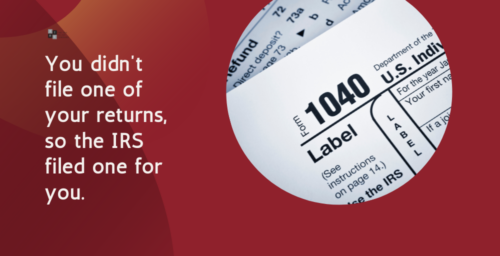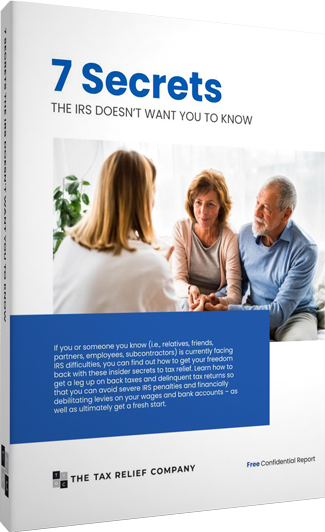SFR- Substitute for Return
The IRS filed a Substitute for Return on Your Behalf! Just what is an SFR?
If you failed to file your tax return(s) for one or more years, you might be surprised to learn that the IRS has filed an SFR. A substitute tax return on your behalf. When the IRS decides to do this, they base the substitute return solely on whatever information they have at their disposal.
Unfortunately, when they file the return(s) for you, they won’t allow deductions, write-offs, or credits. And their computer programs, in many cases, could overstate your tax liability.
Naturally, the best way to avoid this is to file on time—every year. However, if you are delinquent and are still behind in filing those years, here’s more information on how the process works.
The Process for an SFR, when the IRS Filed a Substitute for Return on Your Behalf
When the IRS begins the substitute for the return process, they’ll send a letter informing you they have not received a return for the delinquent year(s). Then, they will propose a tax liability assessment (plus additional penalties and interest) based on your income from those years. The letter also notifies you that you have 30 days to submit a completed 1040. Finally, the signed Consent to Assessment and Collection form or a return letter provides the reasons you’re not required to file or any other special circumstances you feel the IRS needs to consider.
If you don’t respond within 30 days, the IRS is required by law to send a statutory notice of deficiency (SNOD), also known as a 90-day letter. This letter notifies you that the IRS will assess the tax owed and any penalties and interest and informs you of your right to appeal to the U.S. Tax Court.
Once you receive this letter, you have 90 days to dispute the amount proposed from the letter’s date. If you don’t respond to the SNOD, the IRS can assess taxes and begin collection efforts, including liens, levies, and garnishments.
You might wonder how the IRS gets the information they use to prepare your substitute returns.
The Substitute for Return (SFR) program gathers information from W-2s and 1099s, and third-party sources and then creates the return based on that information. Once the IRS computer has filed a substitute return, the IRS will inform you by mail and ask for your consent to the proposed return. The SFR only allows for the standard deduction and a single or married filing single status based upon the prior year’s filing.
What do you need to do when the IRS has filed an SFR- Substitute for Return?
You can contest the amount by filing a correct return even after the IRS has filed a substitute return and assessed taxes. If your attempt to challenge doesn’t succeed, you’ll need to pay the amount due and file a claim for a refund. If the IRS denies your claim, you can still file an appeal.
Don’t wait any longer! File Your Back Taxes with The Tax Relief Company to avoid additional fees and penalties.
It would be best if you always tried to file your tax returns on time. If you failed to do so in the past, you should still consider filing a delinquent return. This allows you to take advantage of your deductions and exemptions. You might even be eligible for a refund in some cases. However, it would be best if you acted fast, as the time limit to claim the refund is three years from the original filing deadline. Even if you won’t receive a refund, the IRS takes weeks or months to process your original returns. We will request the suspension of all collection efforts while investigating the filings.
Jeffrey Schneider, EA, CTRS, ACT-E, and The Tax Relief Company can help file your returns and navigate the SFR process regardless of your situation. We specialize in helping taxpayers. Generally, you will not have to speak to the IRS ever again.
https://thetaxreliefco.com/about-the-tax-relief-company-team/Please get in touch with us today by calling 877-355-8010 or completing this form. We offer free consultations to assess your tax situation and work toward agreeable solutions.
The statute of limitations for receiving tax refunds is only three years from the original filing deadline. So please reach out today!
The content provided here is for informational purposes only and should not be construed as legal advice.



